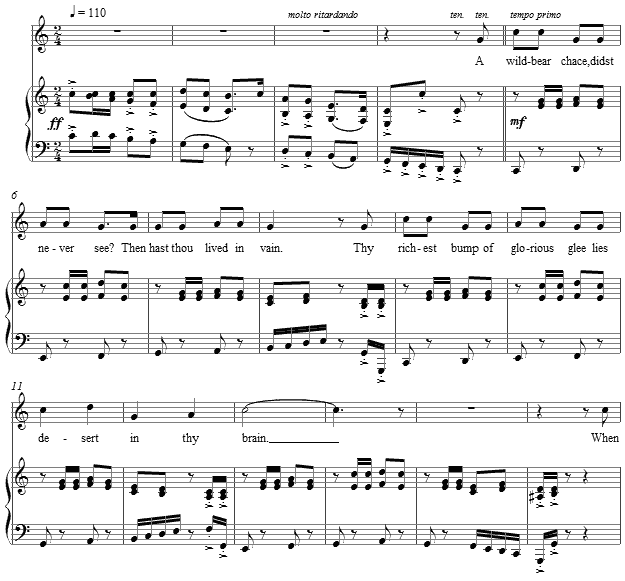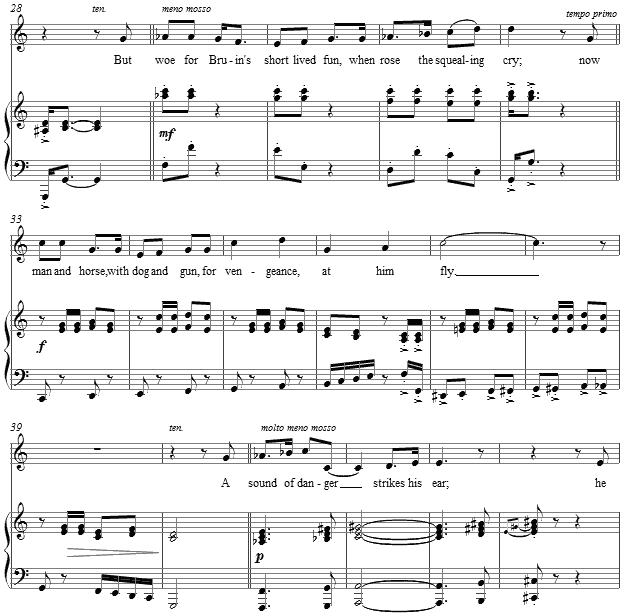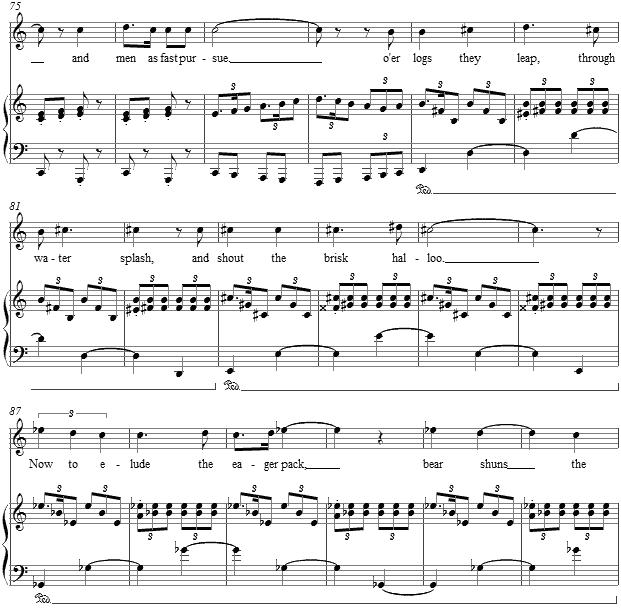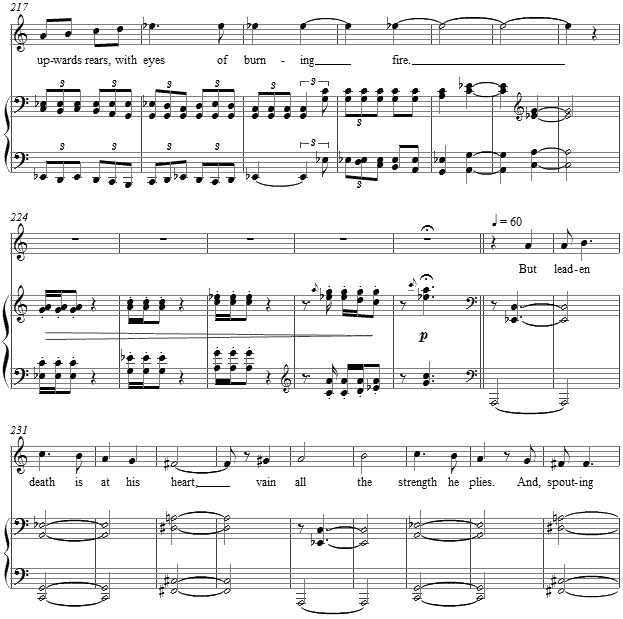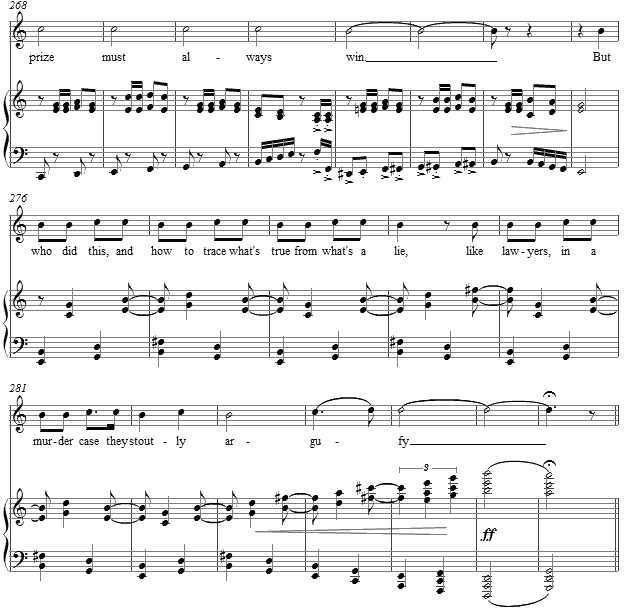Music and Texts of GARY BACHLUND
Vocal Music | Piano | Organ | Chamber Music | Orchestral | Articles and Commentary | Poems and Stories | Miscellany | FAQs
The Bear Hunt - (2008)
Abraham Lincoln
for medium voice and piano
A wild-bear chace, didst never see? [ 1 ]
Then hast thou lived in vain.
Thy richest bump of glorious glee,
Lies desert in thy brain.
When first my father settled here,
'Twas then the frontier line:
The panther's scream, filled night with fear
And bears preyed on the swine.
But woe for Bruin's short lived fun, [ 2 ]
When rose the squealing cry;
Now man and horse, with dog and gun,
For vengeance, at him fly.
A sound of danger strikes his ear;
He gives the breeze a snuff;
Away he bounds, with little fear,
And seeks the tangled rough.
On press his foes, and reach the ground,
Where's left his half munched meal;
The dogs, in circles, scent around,
And find his fresh made trail.
With instant cry, away they dash,
And men as fast pursue;
O'er logs they leap, through water splash,
And shout the brisk halloo.
Now to elude the eager pack,
Bear shuns the open ground;
Through matted vines, he shapes his track
And runs it, round and round.
The tall fleet cur, with deep-mouthed voice,
Now speeds him, as the wind;
While half-grown pup, and short-legged fice, [ 3 ]
Are yelping far behind.
And fresh recruits are dropping in
To join the merry corps:
With yelp and yell, -- a mingled din --
The woods are in a roar.
And round, and round the chace now goes,
The world's alive with fun;
Nick Carter's horse, his rider throws,
And more, Hill drops his gun.
Now sorely pressed, bear glances back,
And lolls his tired tongue;
When as, to force him from his track,
An ambush on him sprung.
Across the glade he sweeps for flight,
And fully is in view.
The dogs, new-fired, by the sight,
Their cry, and speed, renew.
The foremost ones, now reach his rear,
He turns, they dash away;
And circling now, the wrathful bear,
They have him full at bay.
At top of speed, the horse-men come,
All screaming in a row,
"Whoop! Take him Tiger. Seize him Drum."
Bang, -- bang -- the rifles go.
And furious now, the dogs he tears,
And crushes in his ire,
Wheels right and left, and upward rears,
With eyes of burning fire.
But leaden death is at his heart,
Vain all the strength he plies.
And, spouting blood from every part,
He reels, and sinks, and dies.
And now a dinsome clamor rose,
'Bout who should have his skin;
Who first draws blood, each hunter knows,
This prize must always win.
But who did this, and how to trace
What's true from what's a lie,
Like lawyers, in a murder case
They stoutly argufy. [ 4 ]
Aforesaid fice, of blustering mood,
Behind, and quite forgot,
Just now emerging from the wood,
Arrives upon the spot.
With grinning teeth, and up-turned hair --
Brim full of spunk and wrath,
He growls, and seizes on dead bear,
And shakes for life and death.
And swells as if his skin would tear,
And growls and shakes again;
And swears, as plain as dog can swear,
That he has won the skin.
Conceited whelp! we laugh at thee --
Nor mind, that now a few
Of pompous, two-legged dogs there be,
Conceited quite as you. [ 5 ][ 14 pages, circa 7' 00" ]
Abraham Lincoln
Lincoln himself referred to his poetry as "doggerel." This self-effacement does not lessen the charm and fine narrative of the poem. Dating from between 1846-7, it was an unusual work compared to his other writings, prose and poetry alike. The poem might well have validated for his political opponents that he was "a hick at heart." Nevertheless, this story in rhyme is complete with a moral, and its end-stopped lines and monosyllabic race to the end is a fine example of 19th century language. As to the moral, Lincoln chides us all with the notion that there are "pompous, two-legged dogs" which are as conceited -- and probably as "gassy" for politicians are so often thought to be long-winded and gas bags -- as the pompous, conceited "fice" by which the moral is told.
For more on Lincoln, there is a fine site for The Abraham Lincoln Association at the University of Michigan.
Composed for medium voice and piano, the top note is E such that most singers might essay this setting. As the scansion is quite monosyllabic, a squarely square 2/4 underpins the text throughout. The occasional tempo change breaks the repetitive feeling after the first two strophes.
The short introspective section sympathizes with the brown bear for a moment before the "chasing" tempo primo recurs. As the bear notes the riders and hounds, the clear major diatonic major morphs to parallel augmented chords.
A triplet pattern accelerates this "chase" within the frame of reference of the original tempo and meter, as the tonal regions slip past.
A recurrence of the musical portrait whelping dogs in the distance slows the forward motion as the bear falls from the riders' shots. The tempo slows dramatically and half diminished seven chords step slowly downward as the text paints the dying bear.
Reprises of the opening theme yields to a harmonically static moment as Lincoln paints an image of the "lawyers" dispute.
The last reprise of the opening theme ends with a two measure allargando to a simple tonic in several octaves.
The score for The Bear Hunt is available as a free PDF download, though any major commercial performance or recording of the work is prohibited without prior arrangement with the composer. Click on the graphic below for this piano-vocal score.
NOTES
[ 1 ] "Chace," an older variant spelling of "chase."
[ 2 ] "Bruin" is a variant for brown bear, once common in rural America. This great predator was highly feared, as mankind moved into new frontier lands, and the image of the bruin has lingered as one may know from the professional hockey team, the Boston Bruins, and the collegiate athletics at one of my alma maters, the University of California at Los Angeles. In the age in which this poem was written, a bear hunt was indeed a dangerous and deadly pursuit.
[ 3 ] "Fice," an obsolete English word still used in Kentucky and some other Southern locales for a small dog or cur. A variant spelling is 'phyce'. It is evidently the last small remnant of the old English "foisting cur". The foisting (or fisting) dog was a sort of lap-dog, so called from its bad habits, which often have to serve as an excuse for an owner's flatulence, as the word from circa 1770 for flatulence was "fist." From this root comes the adjective, "feisty." Merriam-Webster identifies this as the variant for "feist," as well.
[ 4 ] American slang for "to argue greatly." Lincoln joins this with the image of the lawyer, such were the "feisty" debates in courtrooms and politics.
[ 5 ] Lincoln reminds us that "pompous, two-legged dogs there be" which would steal a prize, and ridicules them in this moral to the story.
Lincoln was firm in this conviction, as he stated of the struggle against such thinking, "It is the eternal struggle between these two principles — right and wrong — throughout the world. They are the two principles that have stood face to face from the beginning of time; and will ever continue to struggle. The one is the common right of humanity, and the other the divine right of kings. It is the same principle in whatever shape it develops itself. It is the same spirit that says, 'You toil and work and earn bread, and I'll eat it.' No matter in what shape it comes, whether from the mouth of a king who seeks to bestride the people of his own nation and live by the fruit of their labor, or from one race of men as an apology for enslaving another race, it is the same tyrannical principle." [ Seventh and last joint debate with Steven Douglas, at Alton, Illinois, on 15 October 1858. ]

